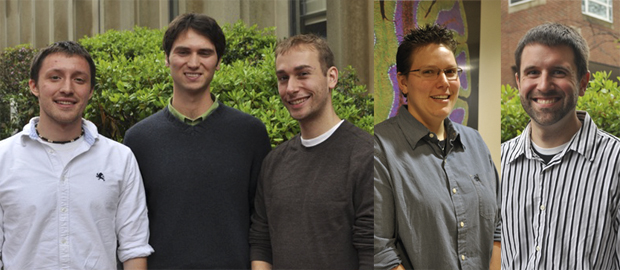Grants help research go from laboratory to market
Virtual Incubator Program accepting preliminary proposals

Some of last year's winning teams include Jason Urton, Joshua Silverman and Bill DeRusha (left) who pitched Zen.do, a study tool with mobile potential; Erin Jonasson (center) who presented a method of conditionally stopping the action of essential genes in a model organism and Jared Auclair (right) whose team is working on halting the progression of Amyotrophic Lateral Sclerosis (ALS).
Last year’s Virtual Incubator seed money landed one group of Brandeis students an office in Rhode Island, additional funding to take their smartphone study aid to the next phase, and some nice PR on Entreprener.com. Another groups’ ALS therapy is under license to a company for commercial development.
With those experiences and more to help, the second annual Virtual Incubator and Sprout Grant funding is expected to bring out a new round of bright ideas.
Funded by the Provost’s Office and the Office of Technology Licensing (OTL) through its Brandeis University Virtual Incubator Program, this new initiative is designed to encourage and support entrepreneurial activity within the Brandeis community. This includes graduate and undergraduate students, postdocs, faculty and staff. The grants are intended to help campus entrepreneurs launch their research and ideas from the lab to the market. Proposal packages are confidentially submitted to the OTL.
“This year we expect to hold two separate judging sessions — one for life sciences, and one for IT related inventions,” says Irene Abrams, associate provost for innovation and the
executive director of OTL. Each session will have about five judges.
Abrams, who created the program, says she’s excited about this year because it is building on last year's success.
“Last year it was the first time this type of program was run at Brandeis, but this year, word has spread about the Sprout Grants, and there is a lot of interest in the program across the sciences,” says Abrams. “My expectation is that we will receive a greater number of applications. We’ve already gotten a lot of questions from potential applicants, and I'm really looking forward to seeing what everyone comes up with when we get the preliminary applications on Feb. 10th.”
Preliminary proposals are due by Friday, Feb. 10, 2012. But early submissions are encouraged as preliminary proposals are used to advise applicants and help them prepare final proposals, which are due by Friday March 9. Information sessions are available to answer applicants’ questions.
Applicants will be asked to present their project to a panel of outside judges on Thursday March 29. Grant awards will be announced mid-April.
Nearly 60 scientists participated in the process last year, which is a big showing according to Abrams.
“Of those, more than half had never participated in commercialization activities — filed patents or interacted with industry — at the university before, so I felt it was a huge success in terms of outreach and stimulating entrepreneurship on campus,” Abrams said.
Other winners last year included Jared Auclair, a postdoctoral fellow in the Petsko/Ringe laboratory whose team is working on a way to aid in halting the progression of Amyotrophic Lateral Sclerosis (ALS). Auclair’s team was awarded $10,000.
Erin Jonasson, a biology graduate student in the Yoshida lab, presented a method of conditionally stopping the action of essential genes in a model organism. Essential genes are necessary for life, so if this project works, scientists can begin to study the role of these genes in basic life processes. Jonasson’s team was awarded $10,000.
Rory Coffey and his team plan to target Ras, a mutated protein that has been found in 20 to 30 percent of cancers.
“If successful, this grant will support the groundwork needed to justify screening for a drug that will use our mechanism and directly target mutated Ras for degradation,” says Coffey, whose team included Marcus Long, Ruibao Ren and Liz Hedstrom.
Deadlines
Preliminary proposals for this year’s Sprout Grants are due by Friday Feb. 10.
Who may apply?
Undergraduates, graduate students, post-doctoral fellows and faculty and staff from any Brandeis department or school are eligible to apply for Sprout Grants. In order to be funded, at least one member of the entrepreneurial team must be eligible to be a Principal Investigator (PI) at Brandeis. A PI team member is not needed to submit a preliminary proposal; the office will help applicants find an appropriate PI, if necessary. In addition, not all team members must be from Brandeis.
Eligible research
There are no restrictions on the type of project that may receive a Sprout Grant, other than good taste and legal concerns. It can be developing a smartphone app, an enzyme, a drug, or something else — just make it novel, with commercial potential.
Grant amounts
A total of $50,000 in Sprout Grants will be awarded during the Spring 2012 Competition. It is anticipated that funding will cover a total of four Sprout Grants.
The maximum amount of funding for an individual project will be $20,000, so smaller budgets are encouraged. The key is to match your budget request to the funding you need to get your idea off the ground. Funding will be provided for a period of up to 12 months, and extensions will not be granted.
Read about last year’s program on BrandeisNow
Categories: Business, Research, Science and Technology





